
Maybe I should have listened to the voice telling me to walk away, but I needed a watermaker after my Osmosea unit died and here was a Spectra unit, supposedly the Rolls Royce of watermakers, being advertised at a fair price.
Whenever the owner of something that's not working tells you how easy it is to fix, ask yourself why they haven't done so themselves. It'd been left in a heap for a few months and who knows how many bits of it had stopped working in the meantime. "You'll probably find it just needs a bit of a clean" the seller chirped as I handed over the cash against my internal screams to turn and walk away.
The thing that sold it though was that I'd read Spectra sell a rebuild kit with all the internal parts that effectively make the unit like new. Later that evening I learned these kits retail at over £1,000, for a handful of proprietary parts and a lot of imperial-sized O-rings - not an option for me. So the challenge began to see how cheaply I could get fresh water out of this thing.
The unit is essentially in four parts: the 12V pump, the pressure intensifier (also known as a Clark Pump), the membrane, and the electronics.
Fresh water can permeate the membrane, which filters out salt, bacteria, and most minerals dissolved in the seawater making it safe to drink, but it needs to be fed with a pressure of 60bar and a flow rate around 9lt/min in order to work. The 12V pump is meaty, it draws up to 20A, but even that isn't enough to get the pressure and flow needed. That's the job of the intensifier. It's a collection of valves and pistons that cleverly recycle the pressure at the output of the membrane and add it to the pressure going in. Over the first couple of minutes of operation the pressure in the intensifier builds up and as it hits 60 bar the unit starts producing clean 'product' water.
The pump
This story is from the December 2022 edition of Practical Boat Owner.
Start your 7-day Magzter GOLD free trial to access thousands of curated premium stories, and 9,000+ magazines and newspapers.
Already a subscriber ? Sign In
This story is from the December 2022 edition of Practical Boat Owner.
Start your 7-day Magzter GOLD free trial to access thousands of curated premium stories, and 9,000+ magazines and newspapers.
Already a subscriber? Sign In

Orca sink yacht in Strait of Gibraltar
Spain's maritime rescue service, Salvamento Maritimo, has reported that a 15m (49ft) yacht sank in Moroccan waters in the Strait of Gibraltar following interaction with a pod of orca.

No kill cord or lifejackets were worn during fatal powerboat crash
A kill cord and lifejacket are useless unless worn-that's the warning from the Marine Accident Investigation Branch (MAIB), following its investigation into a powerboat crash that killed a 32-year-old woman and five-year-old girl on 2 October 2022.

Multihull sail work
Brush up on multihull sailing skills before heading off on charter with Gavin Le Sueur's guide to spinnaker handling, tacking and gybing

Five top causes of engine failure and how to prevent them
Jake Kavanagh talks to Sea Start marine engineer Nick Eales about how to avoid the five major causes of an engine breakdown at sea
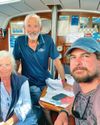
Sail the Atlantic with strangers
Would you sail across the Atlantic with someone you've just met? Ali Wood meets the cruising crews who've done just that
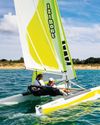
IZIBoat: simple sailing
Rupert Holmes sails an innovative catamaran design intended to widen participation in sailing among those with little time to get on the water in more conventional craft
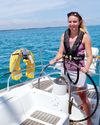
30 WAYS TO GET AFLOAT
From tall ships to small dinghies, you needn't own a boat to sail. Ali Wood looks at the options, and how skippers can also find crew
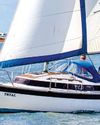
Boats for restoring under £20,000
Duncan Kent picks the best sub-35ft sail and power boats to look for when aiming to undertake a restoration on a budget

Seaworthy dinghies for less than £500
For low cost traditionally-styled GRP trailer-sailers, consider the Foreland and the Otter available at bargain basement prices
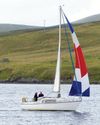
Playing with coloured sails
Maintaining an hourglass-shaped balloon and ratcheting up the log numbers